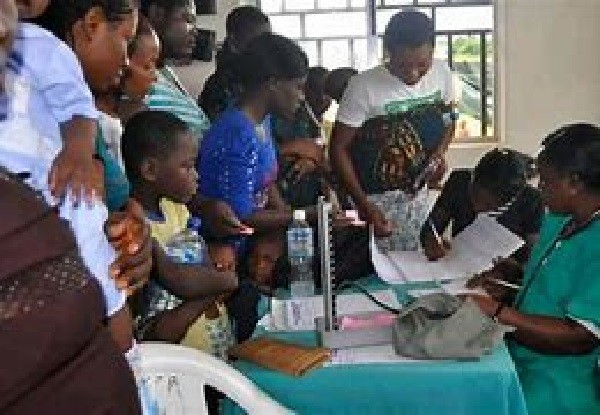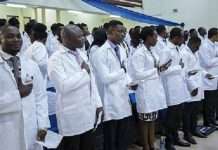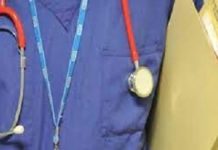
The quality and accessibility of healthcare services in Nigeria have always raised many questions in the minds of patients, healthcare experts, and the general public. Many people believe that Nigeria is seriously lagging behind in terms of the delivery of quality healthcare services to its teeming population, most of who are financially handicapped due to the precarious economic situation of the country.
While healthcare in Nigeria is supposed to be the concurrent responsibility of government at all levels, there seems to be an imbroglio in the sense that the government has not done enough to safeguard the lives of its citizens who now patronize charlatans, parading themselves as traditional and alternative medicine practitioners.
According to the World Bank, Nigeria spends about 3.89 percent of its GDP on healthcare; yet there is nothing significant to show for it, in terms of improvement in the general health indices of the populace. If the World Bank figure is true, then it means there is something amiss in government quarters because that figure is quite significant enough to spur some level of improvement in the health sector of the country.
Unfortunately, there has been a perennial issue of corruption in Nigeria’s public health sector. Despite the creation of the Anti-Corruption and Transparency Unit (ACTU) in the Federal Ministry of Health, sharp practices still take place with the connivance of senior officials and their cohorts in the several agencies and parastatals.
In January 2021, the Socio-Economic Rights and Accountability Project (SERAP) raised the alarm concerning the disappearance of the sum of N3.8 billion meant for teaching hospitals, medical centers, and the National Agency for Food and Drug Administration and Control (NAFDAC). In a letter dated 2 January 2021, signed by SERAP’s Deputy Director, Kolawole Oluwadare, the organization observed that: “Corruption in the health sector can cause serious harm to individuals and society, especially the most vulnerable sectors of the population. These missing funds could have been used to provide access to quality healthcare for Nigerians, and meet the requirements of the National Health Act, especially at a time of COVID-19 pandemic.”
Some of the examples of corrupt practices that have continued to undermine the delivery of quality healthcare services to the Nigerian populace include employment racketeering, bribery, diversion of funds, and conversion of medical cases to private practice. These realities are not only prevalent in Nigeria but also in many other low and middle-income African countries.
According to Transparency International, these factors thrive largely “because competence and integrity are undermined by poor working conditions and a weak system.” In spite of all the reforms and monetary allocations in the Ministry of Health, Nigeria’s national health access remains at 43.3 percent, leaving the remaining 57 percent to seek self-help measures. This accounts for the embarrassing rate of patronage accorded quacks and charlatans, especially those in traditional and alternative medicine practice.
Another issue that should bother Nigerians is the fact that of the 30,000 primary healthcare centers spread across the 774 local government councils in the country, less than 6,000 can actually provide basic health services. It has also been discovered that 70 percent of primary healthcare centers lack drugs and personnel.
The malfunctioning of primary healthcare centers in Nigeria has led to more spending in trying to cure diseases that are largely preventable. This aberration will continue until the primary healthcare centers begin to adequately play their preventive roles through education on lifestyle choices, frequent health checks, enlightenment, awareness, campaigns, screenings, sex education, distribution of mosquito-treated nets, distribution of contraceptives to women, as well as education on hygienic practices, safe water, and clean environment.
The Nigerian Association of Resident Doctors (NARD) and its parent body the Nigerian Medical Association (NMA) have for so many years been engulfed in a series of industrial disputes that have led to the collapse of activities in public hospitals in the country, thereby forcing patients to seek alternative solutions in private hospitals. Such scenarios had led to the death of many patients and had forced many of our best brains to seek better working conditions abroad.
Even most of the private hospitals themselves are not well-equipped to offer excellent services. Some of them are actually death centers. The few private hospitals that are doing well in Nigeria are those owned by religious missions like the Roman Catholic Church, the Anglican Communion, the Ahmadiyya, and the Seventh Day Adventist – just to mention a few. Stakeholders have argued that the fortunes of the Nigerian health sector will continue to dwindle with the unending brain drain, caused by the very abysmal working environment in the country.
During the commemoration of World Family Doctors’ Day (WFDD) 2022, the Society of Family Physicians of Nigeria (SOFPON) said urgent steps must be taken to address the lack of funding for the nation’s healthcare sector. They also called on stakeholders to intervene in reversing the alarming increase in the prevalence of non-communicable diseases in the country. Briefing journalists in Jos in May 2022, the physicians declared that family doctors are taking the lead in providing for the health needs of families all over the country.
Addressing the media, SOFPON President, Prof. Musa Dankyau said, “Nigerian family doctors are always there to care. The theme highlights important issues for SOFPON members, as we join our colleagues all over the world. Family doctors are present at all times because continuity of care is a fundamental feature of our practice. We continuously provide care from cradle to grave through our first contact practice and coordination with other specialists and health professionals.
“This creates a special challenge for Family doctors today to adopt and constantly refine new strategies and technologies including telemedicine which will enable us to always be there. Family doctors are there, wherever and whenever that may be. We are at the frontline, delivering service in a variety of health institutions from one-man to large Tertiary Hospitals. This also comes with significant risks for SOFPON members working at the frontline of disease outbreaks and insecure locations throughout Nigeria. “
Dankyau also urged his colleagues to be steadfast in championing the cause of good governance which has positive outcomes for the health sector in particular. “We must therefore remember to be advocates for good governance as a basis for providing solutions to insecurity and health governance as a bedrock of a robust health system which can respond effectively to disease outbreaks,” he said.
Dr. Christian Okeke of St. Agnes Hospital, Maryland, Lagos, also believes that government should make the working environment more rewarding for Nigerian doctors. Aside from the increment of their salaries, he recommends the provision of adequate security for them and their families.
According to him, St. Agnes is one of the few hospitals that provide both primary and secondary health care services to patients. Originally a Catholic hospital, St. Agnes’ door is open to all Nigerians and foreigners, irrespective of tribe, race or religion. The hospital has both in-house and visiting consultants who also handle referrals.
Realistically, government alone cannot provide adequate healthcare services to the Nigerian populace. It has to work in tandem with the private sector to achieve excellent universal health coverage in the country. Though Nigeria has adopted social health insurance and has aligned itself with the global clamour for universal access to affordable health care, the government and all stakeholders must work together to ensure that policies and projects are pursued and implemented with nationalistic zeal.













